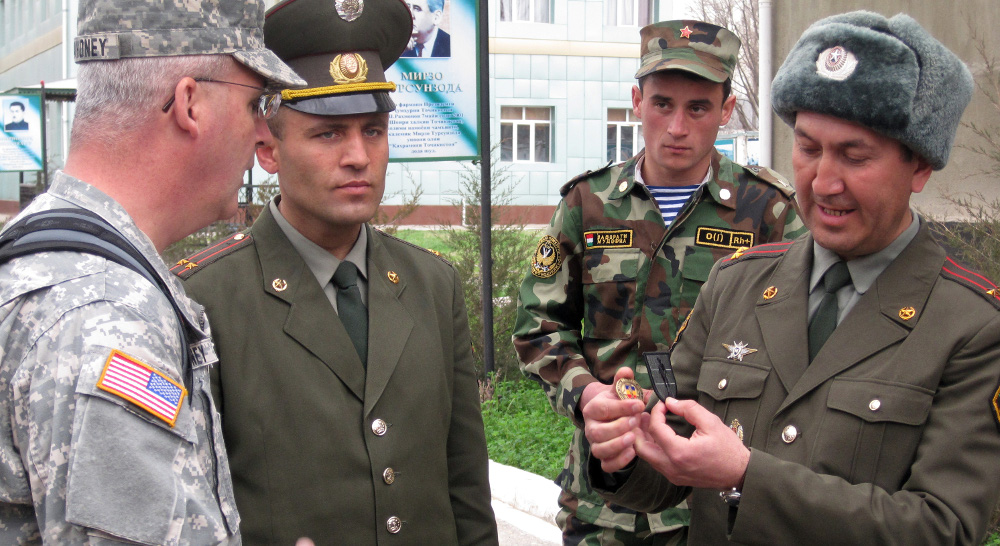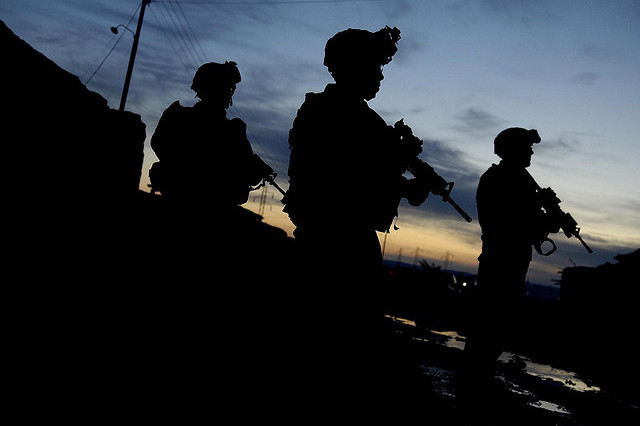by Joshua Kucera
The United States plans to give Central Asia an additional $50 million in military aid under a new program, with the bulk of the aid focused on Tajikistan, budget documents released by the White House show.
The money would be part of the Counterterrorism Partnerships Fund, a Pentagon program launched in 2014 aimed at training militaries around the globe to fight terrorism. In the past, all of the funding in the program has gone to countries in the Middle East and Africa, but starting this year Central Asia would receive $20 million from the fund, and next year, $30 million.
“The [Department of Defense] proposes allocating CTPF funds in Central Asia to counter the Taliban, ISIL, and other regionally-based terrorist groups, and to promote stability in the region. A key partner nation in the region is Tajikistan,” the DoD wrote in budget justification documents released last week. “CTPF funding will support [counterterrorism] partners in a region where war in Afghanistan and other regional pressures challenge the security interests of the U.S., its allies, and partners.”
Incidentally, last week the U.S. top intelligence official testified in Congress that while Central Asian governments perceived spillover from Afghanistan to be the greatest threat to their security, the greater threat is likely to come from other factors including “official mismanagement, low commodity prices, declining trade and remittances associated with Russia’s weakening economy, and ethnic tensions and political repression.” The intelligence report did note that “Russia … is likely to use the threat of instability in Afghanistan to increase its involvement in Central Asian security affairs.”
News about the new aid program comes at a somewhat awkward time, just after Tajikistan’s government crushed its only significant opposition party, the Islamic Renaissance Party of Tajikistan, on the (improbable) grounds that it was a “terrorist” organization. The U.S. State Department has expressed “concern” over the moves to shut down the party.
U.S. military aid to Central Asia has fluctuated substantially over the past few years. Kyrgyzstan and Tajikistan saw big boosts in U.S. training of their special forces in 2012 and 2013, but that training dropped off dramatically after that. This would be the first big American training effort since then, though “big” should of course be understood in Central Asian terms. The region is still relatively insignificant in U.S. eyes: the “Greater Levant” region of Jordan, Lebanon, and Turkey, is getting $470 million next year, compared to Central Asia’s $30 million.
The Counterterrorism Partnerships Fund has been politically sensitive, with some in Congress expressing skepticism that the Pentagon needs yet another “slush fund” for training militaries abroad. This $50 million for the region is just the White House proposal and it still must be approved by Congress. Nevertheless, it does indicate that Central Asia, in particular Tajikistan, is again some sort of priority at the Pentagon.
The budget documents don’t indicate how precisely the money will be spent, what security structures will get it, or what portion of it will be dedicated to Tajikistan and what to other countries in the region. The full Central Asia section of the proposal:
The DoD proposes allocating CTPF funds in Central Asia to counter the Taliban, ISIL, and other regionally-based terrorist groups, and to promote stability in the region. A key partner nation in the region is Tajikistan. CTPF funding will support CT partners in a region where war in Afghanistan and other regional pressures challenge the security interests of the U.S., its allies, and partners.
The CTPF funds will be used to assist in securing borders with Afghanistan to interdict illicit movement of people, narcotics, and weapons; deny access to VEOs; and conduct effective counter-incursion operations to disrupt VEOs. The CTPF will also enable U.S.-partner interoperability and collaboration.
In addition to providing operational training and equipment, the CTPF will support development of partners’ institutional capacity to absorb and apply new capabilities into security forces. The CTPF-funded activities will also support partners’ institutional capacity to sustain critical capabilities. In many cases, the CTPF will fund U.S. engagements with partners to enhance U.S. understanding of partners’ capability gaps and to increase interoperability and collaboration.
The following activities illustrate potential uses of CTPF funds in Central Asia. The initiatives outlined below can be changed to respond to world events and evolving security needs.
- Border Security Intelligence, Surveillance, and Reconnaissance (ISR) Border Guards require ISR capability to detect personnel attempting to transit border zone areas that cannot be quickly accessed or continuously monitored by forces on the ground.
- Border Security Engineer Support Border Guards and defense forces conducting border security along the Afghanistan border require improved engineer asset capability to emplace obstacles (earth walls, trenches, wire, and other man-made barriers) in vulnerable areas.
- Border Security Mobility Border Guards and defense forces require improved mobility to secure the border zone, and the capability to quickly mobilize Quick Reaction Forces in response to border incursions and incidents.
Photo: Senior members of the Tajik army
Republished, with permission, from EurasiaNet.






Sounds a bit fishy to me, especially this:
‘The intelligence report did note that “Russia … is likely to use the threat of instability in Afghanistan to increase its involvement in Central Asian security affairs.”’
This does not read as welcoming possible Russian “involvement in Central Asian security affairs” because of the very “instability in Afghanistan” for which the US is providing funds. Doesn’t it make more sense for Russia, not the US, to be stepping up to the task of securing the area?
Or is the US is using “terror” under the guise of “The Counterterrorism Partnerships Fund” as an excuse to arm and train Russia’s (and China’s) neighbours?
Haven’t these guys learnt anything ? Haven’t they seen anything ? Haven’t they heard anything? Have they been sleeping for last 37 yrs and counting ? How could they trust American official exp.anation,intention,and solution?